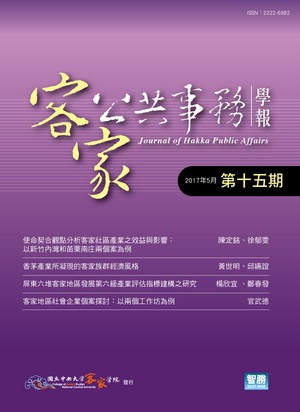Hot News
| 中文篇名 |
香茅產業所凝現的客家族群經濟風格 | |
|---|---|---|
| 英文篇名 |
The Hakka Economic Style Forged by the Citronella Industry | |
| 作者 | ||
| 中文摘要 |
本研究以「產業變遷」、「族群分工」、「市場交易」、「轉型經營」四大主軸來探討香茅產業,透過歷史文獻蒐集及觀察訪談進行研究。研究發現,香茅產業中的勞動情形,因區域條件的差異,區分為家戶生產及委託工廠焗油。香茅產業的族群分工,在傳統家戶生產上,山區多為客家茅農僱用福佬雇工,平地一帶則多為客家族群彼此換工;而委託工廠焗油,則是雇主與雇工皆為客家族群。香茅油的交易方式呈現出客家人從事香茅產業的交易特色:產地市場有現金交易、寄存方式、以香茅油抵借款三種交易方式;批發市場可分為現貨及期貨交易。香茅交易是具風險的經濟行為,客家人在香茅產業所表現之經濟行為,有別於客家族群保守穩定之經濟行事風格。在1950、1960年代,台灣的香茅油約占國際市場總供應量的70%,因交易方式及期貨買賣,促使國家選擇介入香茅交易市場並試圖扮演穩定市場的角色,然而,處於生產底層的茅農,對於政府的獎勵及補助措施感受並不強烈。1968年人工香料的開發,導致傳統香茅油的產製逐漸被取代,現階段香茅產業的經營透過轉型創新,將客家元素融入經營價值鏈之中;香茅油產業所經歷的發展變遷,應可做為凝現理解客家族群經濟行為風格的交融窗口。 | |
| 英文摘要 |
In this study, the researcher adopted the historical literature collection and observation interview methods to investigate the citronella industry in four core areas: “industrial change,” “ethnic group division of labor,” “market trading,” and “transformation management.” The ethnic group division of labor for traditional household production in the citronella industry involved Fu-Lao workers hired by the Hakka citronella farms in the mountains and the Hakkas employed for the various tasks at the flat-plain areas. The employers and employees of the hot oil plants were mostly Hakkas. The citronella oil trading method showcased the trading features of families engaging in the citronella industry. The manufacturer market used three trading methods: cash trading, deposit method, and citronella oil loans. The wholesale markets were divided into spot and futures trading. Citronella trading involved risky economic behaviors. The economic behaviors exhibited by the Hakkas in the citronella industry were different from the conservative and stable economic action style of the Hakka ethnic group. In the 1950s and 1960s, Taiwan’s citronella oil accounted for approximately 70% of the total international market supply. The development of artificial fragrances in 1968 gradually replaced the traditional citronella oil production industry. | |
| 關鍵詞 |
香茅產業、客家族群、族群分工、轉型、鑲嵌、the citronella industry、Hakka ethnic group、ethnic group division of labor、transformation、embeddedness | |
| 刊名 | ||
| 期數 | ||
| 起訖頁 |
037-058 | |
| 出版單位 | ||
| DOI | ||
| QRCode |
| |
| 上一篇 | ||
| 下一篇 |



